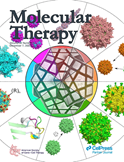The Vector
Editorial Team
Karen Bulaklak, PhD – Editor, The Vector
Jon Brudvig, PhD – Associate Editor, The Vector
Jessica Schneller, PhD – Junior Editor, The Vector
Inside This Issue
Leadership Message
Breaking Through
From Molecular Therapy
Society News
Career Center
Public Policy
Industry News
Leadership Message
Thank You for Your Support This Year

Hello ASGCT Members,
What a year it has been! As we head into the holiday season, I want you all to know how proud I am of the work we’ve done together in 2022. This past year was a productive and busy one that we couldn’t have successfully made it through without your support. A few highlights of 2022 include starting ASGCT’s Insight Series, expanding our global outreach opportunities, and launching a Congressional Policy Fellowship and podcast network. And, of course, it was wonderful to hold our largest-ever Annual Meeting back in person for the first time since 2019. I hope this year’s accomplishments will fuel your energy going into 2023.
With that said, I do want to make sure you keep your access to exclusive membership benefits next year. The best way to do that is to renew your membership (which is now even easier because you can set up automatic renewal for future years.) Renew today so that you can maintain benefits like on-demand access to the Insight Series and Professional Development Cafés, member-rate publication in Molecular Therapy, award eligibility, and much more.
One of the best perks of membership is receiving a discount when you register for the Annual Meeting, which you can do next week. Our Annual Meeting is the largest gathering of gene and cell therapy professionals in the world, and we can’t wait to welcome you to Los Angeles, CA, May 16-20, 2023, for an expanded four full days. That means we’ll have another day of general sessions, field-leading keynote speakers, Exhibit Hall activities, networking, and sharing research via oral abstracts and posters. Abstract submission is open through Friday, Feb. 3, so please send us your research in one or more of these topic categories for the opportunity to present and discuss it at the meeting. You can also win an award for high-scoring abstracts or register for the meeting for free if you’re an associate member and a first and presenting abstract author. Learn more about the awards and incentives here. Please remember there will be no abstract extension this year.
Thank you again for an outstanding year, and I hope you have a wonderful holiday season.
Sincerely,
Hans-Peter Kiem, MD, PhD
ASGCT President
Breaking Through
Ectopic clotting factor VIII expression and misfolding in hepatocytes as a cause for hepatocellular carcinoma
Kapelanski-Lamoureux A, Chen Z, Gao Z, Deng R, Lazaris A, Lebeaupin C, Giles L, Malhotra J, Yong J, Zou C, de Jong YP, Metrakos P, Herzog RW, Kaufman RJ
DOI: https://doi.org/10.1016/j.ymthe.2022.10.004
Summary by Jon Brudvig, PhD
The recent European Commission conditional marketing authorization for Roctavian, Biomarin’s AAV5 gene therapy for hemophilia A, was an important milestone both for individuals with hemophilia A and for the gene therapy field. Many years of preclinical and clinical data supported the approval, demonstrating that hepatocyte-directed expression of Factor VIII (FVIII) can achieve therapeutic levels of circulating protein, reducing bleeding episodes and alleviating treatment burden as compared to protein replacement therapies. Despite this important milestone, hemophilia A continues to be a challenging indication for gene therapy. Both natural and engineered forms of FVIII are notoriously prone to misfolding, leading to cellular stress in transduced cells and subsequent long-term declines in expression. In a new study published in Molecular Therapy, Kapelanski-Lamoureux et al. add a new wrinkle to the FVIII puzzle, demonstrating that the combination of FVIII misfolding and high-fat diet can lead to the development of hepatocellular carcinoma in mice.
In this study, Kapelanski-Lamoureux and colleagues treated mice with plasmids expressing B-domain deleted FVIII (BDD-FVIII, the truncated version used in AAV clinical candidates), N6-FVIII (a truncated FVIII engineered for better folding and secretion), or dihydrofolate reductase (DHFR, a well-folded cytosolic protein) all via liver-directed hydrodynamic injection. While this delivery technique achieves only short-term expression, expression levels peaked to high levels and the authors noted a large degree of transgenic protein misfolding and aggregation in hepatocytes. One week after plasmid injection, once FVIII levels fell to undetectable levels, the mice were started on a high-fat diet that was continued for the next 65 weeks. Surprisingly, 100% of the mice previously treated with the BDD-FVIII plasmid developed hepatocellular carcinoma. The improved folding of the N6-FVIII led to a reduced incidence of tumors (58% of mice), while none of the mice treated with the DHFR plasmid developed tumors. Importantly, none of the tumors contained transgenic FVIII DNA, suggesting that the transient expression of the aggregation-prone protein was driving tumorigenesis, rather than oncogenic vector integrations.
The relevance of these results to AAV-based treatments remains to be seen. The expression levels, temporal dynamics of expression, and extent of episomal maintenance are vastly different for AAV versus hydrodynamic plasmid injection. AAV could, however, bring additional potential risks (albeit controversial ones) related to insertional mutagenesis. In any case, this new work highlights the potential for cellular stress related to FVIII expression to push hepatocytes towards an oncogenic fate, an additional hit that could have severe consequences in the context of high-fat diet, preexisting liver disease, or other insults. These theoretical risks combined with the durability issues surfacing in clinical trials highlight the remaining difficulties that next-generation therapies must overcome for this challenging indication.
From Molecular Therapy
 New MTO EIC: Please welcome Timothy P. Cripe, MD, PhD
New MTO EIC: Please welcome Timothy P. Cripe, MD, PhD
We're excited to announce the appointment of Timothy P. Cripe, MD, PhD, who will become the next editor-in-chief (EIC) of Molecular Therapy—Oncolytics on Jan. 1, 2023. Dr. Cripe is a pediatric oncologist and physician scientist who is currently chief of the division of hematology/oncology/blood and marrow transplant at Nationwide Children's Hospital. Dr. Cripe will replace current EIC Yuman Fong, MD, when he begins his five-year term next month.
Submit a nomination for the inaugural Best of Molecular Therapy Award
Nominate yourself or a colleague for this award by Feb. 28, 2023! The Best of Molecular Therapy Award, supported by Phil and Nancy Reilly, highlights the contributions of leading early-career authors to the Molecular Therapy family of journals.To learn more about the nomination criteria, please visit this section of our website.
Latest MT issues: Check out the most recent issues of these Molecular Therapy family journals:
Society News
Apply by Jan. 30 for ASGCT-Pfizer Rare Disease Grant Opportunity
ASGCT and Pfizer Global Medical Grants are now accepting RFPs for projects supporting medical education to increase medical and scientific understanding of gene and gene-modified cell therapies. Organizations can request up to $50,000 for projects that help prepare multidisciplinary teams to integrate gene and cell therapies into the treatment strategies of eligible patients with a rare disease. Learn more and apply here.
Nominate a Colleauge for an Annual Meeting or Commnication Award
We're now accepting nominations for six prestigious Annual Meeting Awards, including two inaugural awards! Submit your nominations by Feb. 28, 2023, for the Outstanding Achievement Award, the Outstanding New Investigator Award, the Sonia Skarlatos Public Service Award, the Jerry Mendell Award for Translational Science, the Best of Molecular Therapy Award, and the Catalyst Award. You can also nominate for our inaugural Science Communication Award, by Jan. 17.
Read Our Abstract Tips and Submit Your Research by Feb. 3
Need some help before you submit your abstract for possible presentation at the 26th Annual Meeting? Read tips by abstract reviewers Phil Tai, PhD, and Paloma Giangrande, PhD, who explain why it's beneficial to submit an abstract and what they look for when selecting research. Remember to send us your abstracts by Feb. 3, as there are no extensions.
Register for Free December Events
Career Center
Are you looking for a job in the field of gene and cell therapy? Check out the new ASGCT Career Center for great opportunities with industry, government, and academic organizations. Sign up to receive alerts for open jobs in your area.
If you're from a recruiting institution, advertise in the Featured Jobs section to target the 5,000+ audience of The Vector.

Featured Jobs
Public Policy
First Gene Therapy for Hemophilia B Approved in U.S.
Last month FDA approved the investigational gene therapy etranacogene dezaparvovec, marketed as Hemgenix, to treat adults with hemophilia B, making it the first gene therapy option for people living with the genetic bleeding disorder. This approval marks the sixth gene therapy approved for use in the U.S., doubling the number of approved products from the beginning of 2022.
Current treatment for hemophilia B requires regular blood transfusions to replace a non-functional clotting factor. Hemgenix treats hemophilia B by delivering a working gene with instructions to produce the missing factor IX in the coagulation cascade. This lowers the risk for bleeding and reduces the need for prophylactic treatment. ASGCT’s President shared more details on the exciting science behind Hemgenix in a recent blog post.
Healthcare Groups Urge Congress to Advance FY23 Spending Bill
ASGCT joined other leading healthcare organizations in a letter led by Research!America urging action from Congressional leadership to complete the Fiscal Year 2023 (FY23) appropriations process before the current continuing resolution (CR) expires on December 16, 2022. The government is currently operating under a CR, which is a temporary measure by which Congress provides flat funding for a limited amount of time. More information on the CR and appropriations process, and what it means for the gene therapy field, can be found in a blog post from this fall on the Prescription Drug User Fee Act (PDUFA) reauthorization.
The sign-on letter urges Congress to work quickly to pass a full omnibus spending package, including increased funding levels for NIH and other key research agencies. ASGCT supports continued innovation of gene and cell therapies by encouraging expeditious funding increases that support research and regulation of clinical development.
SCD Comprehensive Care Act Would Improve Service Access for Medicaid Enrollees
In addition to our advocacy on NIH funding, ASGCT also urged House and Senate leaders to act on the Sickle Cell Disease Comprehensive Care Act (H.R.6216/S.3389) before the end of the current Congress. The act would direct CMS to create a demonstration program in 10 states to improve access to comprehensive, high-quality, outpatient care, including recommended clinical, mental health, ancillary, and support services, for individuals enrolled in Medicaid with sickle cell disease.
There are several gene therapies for sickle cell disease in late-stage clinical trials, but even after approval gene therapy approaches may not be the right choice for every patient. ASGCT supports piloting this comprehensive care program so that SCD patients can reliably access both the best medical care for their situation as well as wraparound support. The SCD Comprehensive Care Act is backed by a wide range of academic, industry, and patient advocacy organizations, demonstrating the broad support and unified commitment to patient access for sickle cell disease advanced care and treatment.
Apply for Congressional Policy Fellowship
Apply for the inaugural ASGCT Congressional Policy Fellowship! In partnership with AAAS, we'll select one applicant for a one-year policy fellowship in legislative offices on Capitol Hill beginning in the fall of 2023. Fellows will provide high-quality, science-based, independent guidance to federal policy makers and elevate awareness of the Society among policymaking circles. Previous fellows describe how this opportunity helped shape their careers and created a lifelong network of contacts and mentors. Fellows must be an ASGCT member with a doctoral degree looking to learn more about the intersection of science and policy. A summary of application materials and FAQ are available, so apply today!